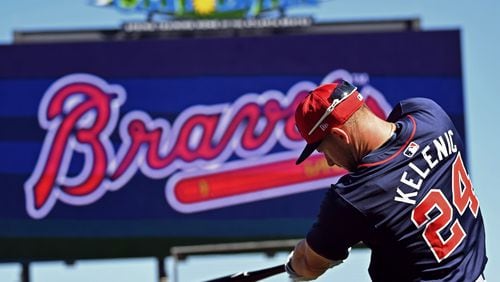Jarred Kelenic has gone through enough reflection and change to admit this: In the past, he was far too attached to his identity as a baseball player. He did not realize it until a fractured foot took baseball from him.
And after the injury, Kelenic, now without baseball, looked at himself in the mirror.
“Well, now who am I?” he asked himself.
This question, and its answers, fueled Kelenic’s path forward toward the person, and subsequently the player, he sought to become. Kelenic fractured a foot, but created a new self – a life where baseball wouldn’t be his entire world.
“I tried to make a conscious effort to never let that happen again because I’m more (than) a baseball player,” Kelenic told The Atlanta Journal-Constitution in front of the dugout at Truist Park recently. “I try to treat people the right way and I have a life to live, just like every single person that comes to these games, and the guys on this field. And so I tried to put in a conscious effort, and when I did that, I kind of found a little bit more happiness in just my daily life. And it allowed me to be a lot more free out here on the baseball field.”
On Monday, the Braves will begin a three-game series in Seattle – where Kelenic began his major-league career and where he broke his foot. Kelenic, who debuted in 2021, spent parts of three seasons with the Mariners.
Kelenic vowed to treat this series as any other three games. “I’m gonna go out and compete the best I can,” he said. He loved his Mariners teammates. He said he “didn’t really have much of a relationship” with manager Scott Servais or president of baseball operations Jerry Dipoto, but didn’t have anything bad to say about either. His job solely was to play baseball.
More than anything, the 24-year-old Kelenic’s return to Seattle is an opportunity to realize his incredible growth since he debuted – as a person first, a player second. He has learned how to find good distractions and eliminate bad ones. With the help of a sports psychologist, he has adjusted his view of baseball.
And now, he’s much happier.
“It’s a big difference,” Kelenic said. “That didn’t just come overnight. It took time. There’s a lot of things that happened in my life that I wasn’t necessarily prepared for that kind of got thrown at me. I tried to handle it (with) what I thought was right in the moment. And there’s definitely things looking back on (it) that I wish I would’ve done differently, and there’s some things I look back that I would’ve done the same thing. But at the end of the day, onward, and life goes on. Try to apply everything that I’ve learned through the ups and the downs, and move on.”
‘Baseball was taken away from me’
On July 20 last summer – the day after Kelenic fractured his left foot by kicking a water cooler in frustration after a strikeout – the Mariners defeated the Twins. Then they called a team meeting. Eugenio Suárez, who led it, called Kelenic to the middle. And then and there, Kelenic’s teammates began offering words of support.
“Hey, just get healthy, get back here,” they told him. “We got your back. You’re gonna be fine.”
“I remember I broke down to tears,” Kelenic says now. “It meant a lot to me to feel my teammates have my back like that. And those guys over in Seattle’s clubhouse, that’s how they were.”
Kelenic won’t ever forget his teammates doing this. It made him want to change because he didn’t want to let them down again.
And at the time, Kelenic’s reality seemed grim: He couldn’t play baseball. What was he to do?
“Yeah, I mean, that’s definitely something that really changed not only my baseball career, I feel like, but changed my life,” he said of the fractured foot. “Baseball was taken away from me, and I saw how fast it can be taken away. I wasn’t ready for that.”
Kelenic decided to fill his time by finding new hobbies. He immersed himself in land management and farming. He’s always loved the outdoors – he owns a farm in Wisconsin and spends part of his offseason there – but he never had much time outside of baseball. So he began reading land-management articles.
Even now, when he’s healthy, he’ll study land management when he’s not playing. He watches hunting videos. He’s gotten really into real estate. He’s a big golfer, so he might golf before a game. He does yoga.
All of this is symbolic of Kelenic’s transformation. It’s representative of one of the biggest lessons he’s learned, and something he wishes he knew when he debuted.
“My biggest thing is you always want your glass full, but you don’t want it full with just baseball,” Kelenic said. “And when I say that, I mean, whether you’re a teacher or whether you’re a cop – whatever you are – your cup needs to be full, but it can’t be of just everything that you do (in your job). Your job will always find time in your life – you don’t even have to try. That other half of the glass is up to us to put in the effort to enjoy our life and do things that bring us happiness because then when it comes to that time of work, it’s not work. You’re just living your life, but you’re using the skills that God gave you.
“And when I felt like I realized that and started to really buy into it – and I’m still learning about it – I just felt like when I came out here, I was so much more free because I didn’t look at results as much. I mean, everybody wants results, right? But what’s more important to me is being out here and being on a baseball field, and using the gifts that God gave me. But I can tell you that when I leave this field, I’m doing other things, too, that bring me happiness and God put into my life. That’s allowed me to play baseball the way that I am.”
Handling the big-league life
How is Kelenic different now than before his broken foot?
The question is simple, but Kelenic’s answer reveals how difficult major-league life can be.
“I think I’m more confident in myself,” Kelenic said. “I’ve put in a lot of work in terms of understanding how I want to view the game and how I want to view the way that I play it. I think when you get to the big leagues and you have all this attention and stuff like that, it can create distractions. I’ve been doing a better job of minimizing those distractions. I said earlier that we’re baseball players, we’re here to play baseball. And sometimes when you get to the big leagues, I feel like there can be a lot of people pulling at you in different directions. But the foundation is playing baseball. It was like that when I was in high school; it was like that through the minor leagues. It’s an adjustment period when you get to the big leagues to have that same foundation of it truly being about baseball and being a baseball player.
“I think everybody goes through it at certain times. Some take longer than others. But it’s all about understanding that you’re a baseball player, and you’re here to do your job. The sooner you can realize that and the sooner you can realize what you need to do to accomplish that, I think it frees a lot of extra baggage up.”
To reach this point – one where he feels more at peace – Kelenic had to learn to reduce distractions. In the big leagues, those land mines are everywhere.
He would see people on MLB Network talking negatively about him. He would read what fans said about him.
And he couldn’t have been ready for the death threats he received when he struggled upon entering the majors.
“It was a lot, man,” Kelenic said. “It was right when I came up to the big leagues and I wasn’t really prepared for that. I don’t think I was prepared for that type of attention and that type of spotlight right away. And I’m not saying that I came up too early or anything like that. I just think that, in the minor leagues, you don’t prepare for that.
“And everybody goes through it – some more than others. I think the really good players are the ones that can truly understand to play the game of baseball the right way, and understand the good and bad distractions. That’s one thing I appreciate about (Ronald Acuña Jr.) so much, is that the guy’s an absolute superstar, he’s the best player in the game, and it’s all about baseball when he gets here. He’s a gamer, and you can only respect that.”
To escape the negativity, Kelenic began by not searching for it. He got off social media. He turned off the television.
“I’m a big believer that if you look in the mirror and tell yourself you’re ugly, you’ll find 10 reasons why you’re ugly,” he said. “If you look in the mirror and say why you are beautiful, you’ll find the reasons why you’re beautiful.”
And during this process, Kelenic learned about himself. He discovered things that brought him happiness, and saw how those could become “good” distractions – like land management.
Now, because of everything, he has a full plan to improve his farm.
“No different than a house,” he said. “It has nothing to do with baseball, I don’t need any skills on the baseball field as I do on a farm to make it better. That’s a good distraction, because I find happiness in it.”
‘It didn’t happen overnight’
Kelenic’s sports psychologist has helped him with how to think and how to react in certain situations. He’s still learning daily.
“It didn’t happen overnight,” Kelenic said. “It took a lot of time. It’s taken a lot of patience. And I never really had patience before I met my psychologist to really help me learn. I think it’s all a skill. You’re not born that way, you gotta learn how to do it.”
Before Friday’s series opener against Cleveland, Kelenic was batting .314 with a .759 OPS. He had three RBIs. To this point, he’s also proved valuable in the field and on the bases.
Early in Kelenic’s big-league career, the Mariners sent him down a couple of times. It made it a bit difficult for him to gain footing. “Yeah. I mean, I think it’s tough to stay consistent – emotionally, it’s tough to stay pretty level, even keel,” he said. But he had a great support system, including his parents, behind him.
The Braves have provided Kelenic with a positive environment. One example: After he struck out in a pinch-hit at-bat late in a recent game, Kelenic went back to the dugout knowing his coaches could’ve easily been frustrated. Instead, he encountered hitting coach Kevin Seitzer, whose message was this: “Dude, you took some good swings. It’s tough to come off the bench. Your swing’s right there.”
The Braves, manager Brian Snitker said, are extremely positive with the players.
“And you look at that coaching staff: They know how hard this game is to play because they’ve all been through it, and they’ve been through the trials and tribulations of a season and the ups and downs, and what you gotta do over the course (of it),” Snitker said. “And they can use that to help a young guy like that, as well as the players, his teammates in there, that he can turn to. He’s just a young, talented guy, and he’s learning. He’s learning. He’s doing really well and we’re gonna continue to hang with him and help him and educate him and all that, because there’s a lotta, lotta upside in the player.”
And unlike in previous years, Kelenic isn’t solely reliant on baseball. On the field, his goal is to give 110%, and if the results come, great. Away from the field, his life is full.
‘We’re all trying to swim with the current’
Recently, Kelenic had a conversation with a friend going through a difficult time. Kelenic said his friend – who works in insurance – didn’t want to tell him about all of it because he figured his problems weren’t the same as those Kelenic was enduring as a professional baseball player.
But when they started talking, the friend realized that Kelenic’s problems were similar. It allowed the friend to be more vulnerable and open up about the things he was going through. And even though Kelenic doesn’t sell insurance, he could still help out a buddy.
Forget his status as a major leaguer.
Kelenic, after all, is a human who has fought to conquer battles like the rest of us.
“We’re all trying to swim with the current, not against it,” Kelenic said.
About the Author







